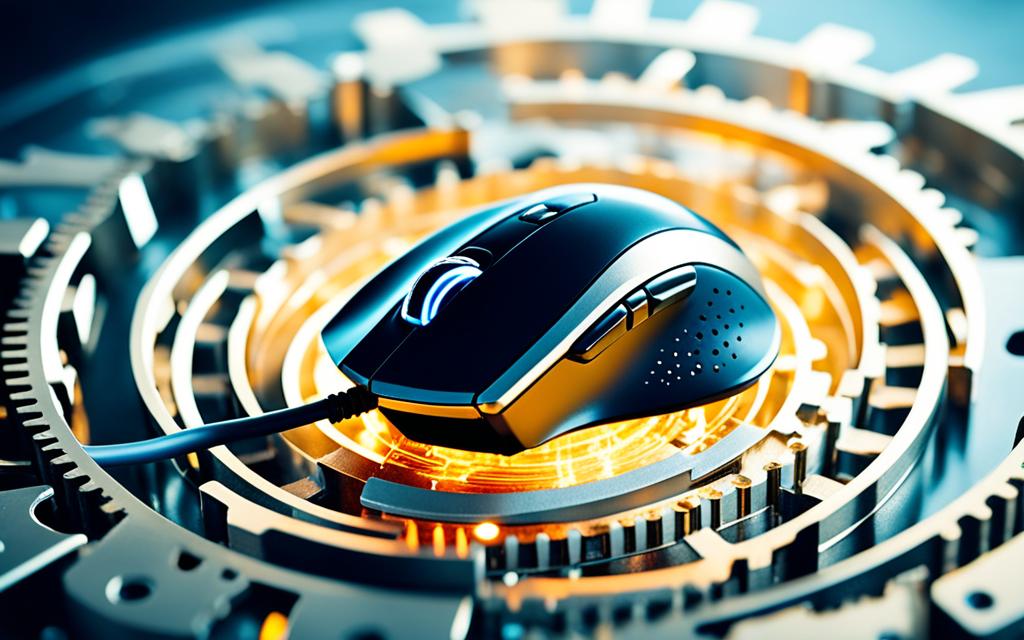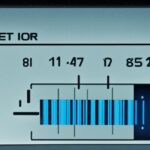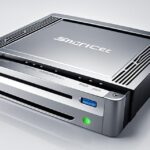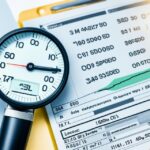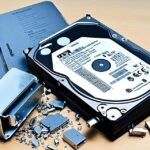Table of Contents
Hard Disk Drives (HDDs) are crucial for today’s computers. They store our apps and files. Over time, a hard drive might slow down, making our computer less responsive. To avoid this, it’s important to keep your HDD in good shape.
This guide explains how to boost your HDD’s speed. It talks about useful tips like removing unwanted files and turning on write caching. These steps help make your hard drive run smoother and last longer. For more advice, check out the full suggestions here1.
Key Takeaways
- Regularly delete temporary files to enhance HDD performance.
- Defragmentation can vastly improve access times and read/write speed.
- Scan for bad sectors as part of regular maintenance for optimal performance.
- Enabling write caching is a simple yet effective way to improve writing efficiency.
- Consider upgrading to an SSD if outdated hardware continues to impede performance.
Understanding HDD Performance Issues
Many factors can make hard drives work slower, leading to HDD performance issues. A big reason for slow HDD performance is too many temporary files2. These files take up space and make the drive slower. Bad sectors on the drive can also reduce its speed as they increase3.
File fragmentation is another big problem. Over time, files can end up all over the drive, which slows access3. Regularly defragmenting the drive can make it work better3. Also, viruses can slow down the HDD by running unwanted tasks3.
To fix HDD performance issues, users should take some steps24. Removing temporary files and fixing bad sectors can help a lot. Using optimisation tools, like MiniTool System Booster, can improve performance by organising files and getting rid of junk data4.
Identifying Bad Sectors on Your HDD
Knowing about bad sectors on HDD is key for keeping your data safe. Bad sectors are damaged areas on a hard drive that can’t hold data correctly. They can happen due to things like sudden power offs, dust, or viruses5. Keeping your hard drive in check is important because bad sectors can slow your computer down or cause crashes6.
To tackle this, you can scan your hard drive for errors in Windows. Go to its properties and under Tools, click “Check.” This lets the system find and try to fix bad sectors. You might notice issues like weird noises, error messages, or blue screens when there are bad sectors7.
Bad sectors are either logical (soft) or physical (hard). Logical ones usually come from software problems, while physical ones show damage to the hard drive itself. Finding these problems early can save your data and keep your drive running well. If you find bad sectors, using tools like AOMEI Partition Assistant can help fix them5.
| Type of Bad Sector | Cause | Symptoms | Recommended Action |
|---|---|---|---|
| Logical Bad Sector | Software errors or data writing issues | System freezes, file corruption | Scan hard drive for errors |
| Physical Bad Sector | Hardware failures, physical damage | Abnormal noises, blue screen | Repair via specialised tools |
| Excessive Bad Sectors | Continual use without maintenance | Drive unresponsive, crashes | Backup data and seek recovery services |
It’s vital to quickly deal with bad sectors. With constant checks and upkeep, you can make your HDD last longer and keep your data safe.
How to Make HDD Faster: Deleting Temporary Files
Improving your hard drive’s performance can be as simple as deleting temporary files regularly. These files build up from using the internet, installing software, and everyday computer use. They take up space and slow your hard drive down. Removing these files frees up space, making your hard drive run faster8.
The Importance of Regular Maintenance
Keeping your HDD in good shape is key to its performance. Using the Disk Cleanup tool in Windows can get rid of these files8. Windows also has Storage Sense, which automatically removes old files and those in the Recycle Bin9. Getting rid of software you don’t need also helps. This is especially true if your system is already struggling with issues that make the HDD slow8.
Let’s look at how deleting temporary files affects HDD performance:
| Action | Effect on HDD Speed |
|---|---|
| Deleting Temporary Files Weekly | Improves response time and loading speeds |
| Using Disk Cleanup | Increases free space and reduces clutter |
| Uninstalling Unnecessary Applications | Streamlines resources for better efficiency |
| Regular Maintenance Checks | Identifies potential errors and prevents slowdowns |
Forming good maintenance habits boosts both speed and efficiency. It also stops problems caused by a full hard drive. Make sure to delete temporary files often. This will make using your computer a much smoother experience10.
Defragment Your Hard Drive Regularly
Defragmentation keeps your hard drive running smoothly. Over time, your hard drive can get cluttered because files get scattered. This can slow down your computer. Regularly organizing your hard drive is a crucial step in hard drive optimisation techniques. It can make your hard drive work faster11.
Windows systems from Vista on have built-in tools for automated defragging, which helps avoid slowdowns. Through the “Optimize Drives” menu, you can see when it’s scheduled and adjust as needed12. For older Windows versions, you might have to defrag manually, which takes more effort. Regular defragmentation gathers all pieces of data together, speeding up your computer13.
If your hard drive gets too cluttered, say 25% over a short time, it can cause more slowdowns13. Regular defrags keep your computer running smoothly. Doing this not only keeps your hard drive in good shape but also extends its life. This way, you get the most out of your technology investment11.
FAQ
How can I improve my HDD performance?
To boost your HDD performance, start by deleting unneeded files. Also, turn on write caching and fix bad sectors. Finally, defragment your hard drive. These steps will make your computer faster and more efficient.
What are the common causes of slow HDD performance?
Slow HDD performance often comes from too many temporary files. Bad sectors and file fragmentation also slow things down. Viruses and malware can cause trouble too. Knowing these problems helps in fixing your hard drive.
How do I check for bad sectors on my HDD?
Check bad sectors by going to your HDD’s properties in Windows. Click the Tools tab, then choose “Check”. This lets your system find and fix any errors it finds, improving your HDD.
Why is deleting temporary files important for HDD maintenance?
Removing temporary files frees up space, making your HDD faster. Do this weekly for better performance. Also, getting rid of duplicate files helps save more space. It’s a key step in HDD care.
How does defragmentation improve my hard drive speed?
Defragmentation tidies up scattered data, making your HDD faster. To defragment, find “Defragment and Optimise Drives” in Windows. Then choose your drive to optimise. It’s a simple way to speed up your computer.
Source Links
- https://recoverit.wondershare.com/computer-problems/how-to-increase-hard-drive-speed.html – [Infographic] How to Increase Hard Drive Speed?
- https://www.diskpart.com/articles/how-to-speed-up-hdd-performance-0725.html – How to Speed up HDD Performance in Windows 10?
- https://www.easeus.com/partition-master/speed-up-hard-drive.html – How to Speed Up Hard Drive in Windows 11/10/8/7 [100% Working Solutions]
- https://systembooster.minitool.com/boost-pc/how-to-improve-disk-performance.html – Top Tips – How to Improve Disk Performance in Windows 11/10
- https://www.diskpart.com/articles/test-bad-sectors-hard-drive-3690.html – How to Test Bad Sectors on Hard Drive or SSD [3 Methods]
- https://www.diskgenius.com/resource/check-fix-bad-sectors-hard-drives.html – HDD Bad Sector: Check and Repair Bad Sectors on Hard Disks (3 Ways)
- https://www.easeus.com/disk-copy/clone-resource/repair-a-bad-sector-in-windows-10-8-7.html – Repair Bad Sector: How to Fix Bad Sectors on HDD in Windows 10/8/7
- https://www.easeus.com/computer-instruction/increase-hard-drive-speed-windows-10.html – How to Increase Hard Drive Speed on Windows 10 [Step-by-Step Guide]
- https://www.cnet.com/tech/services-and-software/quick-ways-to-free-up-drive-space-in-windows-10/ – 8 quick ways to free up drive space in Windows 10
- https://www.avg.com/en/signal/ultimate-guide-to-speeding-up-and-cleaning-up-your-pc – How to Speed Up and Clean Up Your PC
- https://www.crucial.com/articles/pc-users/how-to-defrag-hard-drive – How to Defrag a Computer Hard Drive
- https://edu.gcfglobal.org/en/basic-computer-skills/how-to-defragment-your-hard-drive/1/ – Basic Computer Skills: How to Defragment Your Hard Drive
- https://www.avast.com/c-how-to-defrag-pc-hard-drive – How to Defrag Windows 10, Windows 8, and Windows 7 Hard Drives

